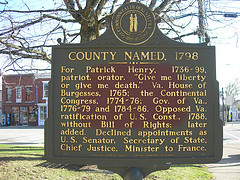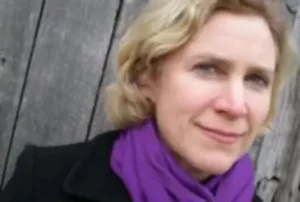
Henry County, Kentucky. Every Memorial Day my husband takes our children to visit three cemeteries in our county. We take grass from the family farm for a great-grandfather, rhubarb for a great-grandmother, peonies and roses, and whatever else is blooming. With these the children decorate the graves of family members going back seven generations. Some day perhaps we will discover where Conrad is buried, and then they will decorate an eighth.
As we drive around my husband points out where all the extended family’s farms have been over the years. In Campbellsburg’s Masonic Cemetery we lay flowers on Cousin Kathryn, who had told us so many family stories, and who is now a story herself. At the Antill cemetery Mark realigns a broken stone and repeats again, in the hope it will sink into the children’s minds eventually, the line extending from Conrad to them.
My own dead are not here. But I too have deep roots in this state, and I was reared 35 miles from where I live. The Germans have marred the word “fatherland,” but I can still say this is my motherland, and certainly one of reasons I care about Kentucky is because I belong here.
Some people move (or stay) home out of need or inertia, but for me as for many others it was love that called me back. This is the sort of argument that either needs no explaining or is inexplicable, but those who have ears can hear it: I had missed my family and old friends. I’d missed my grandfather’s farm in Shelby County, and my old neighborhood outside of Louisville, and the way spring comes. I’d missed the manners here, and the things unsaid, and the idioms of my neighbors, and the dry humor my friend Dr. Bob has perfected—you can come home to language, too. I wanted to be around to hear family stories, and I wanted to be closer to the people I’d buried. All of these things were tied up together in a great Gordian knot that I understood, finally, held me tight. I could take an ax and sever it. I had tried to, the fall I first moved away to college. But some people, mercifully, aren’t much good with tools.
Moving back to a place you’ve grown up gives you an instant increase in what sociologists call social capital—the academic term for the web of associations that bind people in a community to each other. A strong social network has practical benefits and will generally make you happier, and it brings a sense of fittingness. At home you are in a place that is culturally familiar. You live in a landscape that if not overbuilt and polluted, will feel right because it was imprinted on your brain at a young age. Perhaps most importantly, you will pick up the thread of lives of many people you already know. Surely we need to live a long time in one place in order to understand people at all, and surely one of the points of living is to acquire such understanding.
Rootedness doesn’t make you a better or wiser person necessarily, but it does offer an ordering to the mind, a sense of belonging and a (mostly) willing obligation that might make you saner. I think it’s enriching, too. Every community has its own cultural diversity, which it keeps only if it can hold onto its people. Memory is one of the things that makes us most human, but to move is to risk so much of it—family anecdotes, old associations with places, local stories, children’s rhymes and games, knowledge of the soil and countryside, history, recipes. If we move away we can only maintain these things artificially and with effort, and generally we get busy, and there is no one nearby to remind us of how the great-uncles fell out, or how grandmother made bread, and so we lose much of this community- and family-specific culture of ours. When someone leaves it is not just the neighborhood that is diminished, but the individual. Many young people move away expressly to fulfill themselves, only to find they become less of what they are. The best cakes are made from scratch, but not the best people.
Others have made similar arguments on this site, but generally we hear little about the advantages of staying home, and lots about the negatives. Ours is a culture that either celebrates all the possible pluses of moving, or shrugs its shoulders at the assumed necessity, and there is no question the economic deck is stacked against any place that isn’t hip or a megalopolis. The argument is often couched in economic and so-called quality-of-life terms, as if our income and our entertainment were the essential deciding factors of the value of our lives. In Who’s Your City Richard Florida spends a few pages acknowledging the value (to some) of remaining rooted, but devotes the rest of the book to describing the best places for your type of personality at your particular stage of life. His assumption is we can happily leave most human relationships behind, or squeeze out all their juice in an annual visit. That kind of talk makes me want to shout my case for the other side, because our ties to a certain place and certain people are not so easily replaced.
Of course there are some who don’t have a place to go home to. They had Marines or corporate nomads for parents, or their small town or family farm has been developed beyond recognition, and the people are gone, too. But most people move because they want to try a new city, or they want the job that calls them on, not because there is nowhere to return. After a few years of wandering, perhaps they will make one more move and stick. It is not a terrible thing, to move and resettle–once. Every civilization (and every barbarity) has had its share of homesteaders. You can brighten the new corner where you are. You can take hold in a new place and dig in, and certainly sticking where you’ve moved is the next best choice to staying where you’re from.
But I would argue it’s only a next-best. You can’t “choose your roots” any more than you can choose your gene pool. If you are from somewhere, that’s where you’re from. No one becomes a Bostonian by moving to Boston—your children may be able to assume the title, but not you. If you move, you start over, for a clean slate has nothing on it. And it will take the rest of your life in your new place, to build the web of relationships you had as a free birthright in your old place. Plus you’ll never get your family back, unless by some luck they all follow you out.
If the argument for leaving is that you must “Be All You Can Be,” well, that’s the slogan of the Army, one of the great deracinating institutions of modern life, whose organizational purpose–whatever its necessity and merits–is to kill people. If we’re picking slogans here, I much prefer Root Hog or Die, or (with thanks to Kauffman and Stegall) Cast Down Your Bucket Where You Are.
The Greeks, restless as they were, understood home. They imagined Odysseus, who journeyed for years to return to one woman and one little island. They also imagined Antaeus, because they knew any man grows weaker when he can’t touch his own mother Earth. For them ostracism was a serious matter, a kind of social death, and they hated it. In the Louisville newspaper recently someone lauded Socrates as one of the first “world citizens,” but good Greek that he was, he was precisely the opposite. Though the world might wish to claim him now, when he lived he himself only claimed Athens, and he lived and died under his obligations to Athens. Offered a chance to escape, he preferred to stay to drink the hemlock because, he said, having grown up and flourished under her laws, he would not flout them now, even when they ordered his execution. He was a man so tightly bound to the city he had pricked and prodded all his life that he was content to let her put him to death. It was a worse death, he thought, to leave.
That is an extreme view, and an extremely virtuous one. But it is the right idea, that we should spend our lives in the place that nurtured and made us, and where we would be content both to live (prodding away) and to die.






18 comments
Bob Cheeks
I really don’t want to pick a fight but I think “place” is a key element when it comes to understanding our existence as a human being.
“Place” establishes being within the ground of history (man as the zoon historikon) and acts to provide substance to the structure of the mythopoesis that is the ground of culture, community, and of our understanding of existence in reality.
I think it is very much easier to participate in those things that define our humanity (such as asking questions and seeking to experience the divine/human encounter) if we are situated in a “place” that is ours, or the family’s, or the clan, or tribe.
To “wander” implies an upheaval and possible confusion that, at the very least, places a tension on existence that must be considered as we confront the “disorders of the age.”
MMH
Katherine, yes, you’re certainly right: the thing to do is be grateful for what we’ve been given and make the most of it. On the whole I think the benefits of rootedness more profound than those of wandering, but rootedness can be in a culture and in a family; it isn’t necessarily always in a place. Am I extending the sense? Not too much, I think, because even geographical rootedness has to have familial and cultural rootedness to be of value. It’s the permanence and long association that are important. As Plato asks somewhere, “How can anything that is never in one state *be* anything?”
Katherine Dalton
To MMH and Mrs. Wightman: Thank you for your comments. All I can say is your life is your life, and a wise person makes the best of it, and (so very fortunate as most of us are) is grateful for it. I will argue for the benefits of rootedness, which I believe are greater benefits than those of wandering, while every major media outlet will argue in favor of wandering; and so I will argue hard. Is there room on this site for openness to other states, countries and cultures? Of course. But that doesn’t mean I long to move somewhere else, or think I should long, to fulfill myself. Your own view, and your own experience, may well be somewhat different.
Thanks, James, for a better distinction of love of place/nationalism than mine.
MMH
Linda Wightman asks an interesting question: How does the philosophy I see here at the FPR allow for such enrichment, such growth, such joys [the enrichment, etc., that result from her many moves]? I, too, come from a peripatetic, international background and would probably have to agree that one cannot have it all. There is great advantage to exposure to other cultures, not least the permanent sense of being an outsider, which, while sometimes painful, offers the opportunity to see that one’s own culture and beliefs do not encompass reality, that every point of view is by definition limited, and so to be open to others unlike oneself–though I hasten to add that one needn’t share my background to see this. Because in my childhood my family had no geographical roots (my father had left the South as a young adult even before being sent overseas), my parents considered it essential that we have roots within the family. It was imperative that we eat meals together, worship together, and generally spend time together. For that I am most grateful. That may be the best that peripatetics can hope for. But as I’ve gotten older I’ve come to find the sense of place that I find among some Southerners (given FPR, it’s obvious that this is found not only in the South), very attractive. But it’s a sense that, while I feel some affinity for it because of my attentuated Southern roots, is not mine and is probably barred to me.
Anthony
This is an excellent essay.
James Matthew Wilson
Socrates a “World Citizen”! Only if, as T.S. Eliot says, to be universal one must be thoroughly local and particular. You may even underestimate Socrates allegiance to Athens (though one wouldn’t think that possible, given what the Crito shows us). Argues Voegelin, anyway: Socrates found life outside the sacral polis unthinkable; it was itself death, because the world was unintelligible/meaningless outside Athens. Such was not the plea of a club-addicted metrosexual; it was the loyalty of one who new all meaning lies in the concrete conditions of community.
As for love of place/nationalism: the liberal smear that love of the particular has much in common with the modern nationalisms of the Russians (Pan-Slavs), Germans, or Italians (or of any of the other modern varieties of nationalism) is just that — a smear. Each of those movements is denoted primarily by its effort to deracinate people from more particular and experienced loyalties and to bind them to the far more abstract and general ones of “race.” The war-making they begot was not the product of intuitive love of place and community; it was, rather, the desparate project of nation building, the attempt to build conflict fires so hot they could forge a single nation-state out of myriad smaller communities.
There’s more to be said on this, but I hope this at least provokes a little questioning of that awful slander that quietly benefits the ultimate statist “nationalism”: the “world citizen” who must spread his “values” at the end of a smart bomb.
John Médaille
Chesterton’s take on the smallmindedness of the village:
For these were simple men that loved with hands and feet and eyes,
Whose souls were humbled to the hills and narrowed to the skies,
The hundred little lands within one little land that lie,
Where Severn seeks the sunset isles or Sussex scales the sky.
And what is theirs, though banners blow on Warsaw risen again,
Or ancient laughter walks in gold through the vineyards of Lorraine,
Their dead are marked on English stones, their loves on English trees,
How little is the prize they win, how mean a coin for these —
How small a shriveled laurel-leaf lies crumpled here and curled:
They died to save their country and they only saved the world.
D.W. Sabin
Katherine, You are right that “small-mindedness ” and the baser wing of provincialism is as prevalent and widespread in the fancy schmancy big city as it might be in many small towns. Hence the paranoia that often sets in when small town folks actually wave and smile at the Big City tourist who sometimes sees conspiracy in hospitality.
As to who might be the “poorer” for the choice they make…we can argue that well past when the embers go dark. But then, I don’t think it’s much of an argument.
Katherine Dalton
No, we can’t have it both ways. And it’s my part today to make the case for the poor stepsister who stays home and sweeps the hearth.
I’ve never understood age ghettoes either, Mr. Medaille.
I’d say the difference between rootedness and nationalism is the difference between affection and arrogance. Any virtue taken to an extreme will become a vice, but that doesn’t mean it isn’t in its true form a virtue.
I suppose when people say small communities are more prone to “closemindedness” they mean there are fewer places for the odd man out to go. That’s probably true. But I’d guess he generally has a friend or two sticking by. I wouldn’t argue there are no challenges to small communities, but I would say the benefits outway the negatives, except in very unhealthy places, and it has certainly been my experience that smallmindedness flourishes in universities and big cities. We can’t talk as if the fault were unique to small towns in rural Connecticut or the upper South.
D.W. Sabin
Although I’ve now lived in the same house I built a little over twenty years ago in a small town with a Congregational church on the Green, I am one of those community agnostics who is a member of a long line of folks who light out for the horizon. In fact, I’ve almost completed a continental loop that began a long time ago in Massachusetts and Pennsylvania , went west with the Mormon Pioneers on one side or Irish and Alsatian Builders and Railroaders on the other, hit L.A. when it was paradise before the automobile and now I’m back near the original springboard after a childhood in my long lost and much missed Great Basin. I’m no mere tourist in my adopted home though, having served multiple terms in various local commissions in the past. The opportunity to attend and participate in a New England Town Meeting is, bar none, one of the finest things a body and mind can do….particularly when the top agenda item is a collective Bronx cheer sent Hartford way.
I do sometimes envy those locals whose lineage stretches back to Revolutionary and Civil War veterans in the Judea Cemetery but I would not diminish the story of my family’s various migrations a bit. What I do hope is that where ever I rock, the neighbors are hospitable and receptive to a fresh face and crackpot idea rendered in the proper spirit. Community is indeed a place and not simply a state of mind but there is no doubt that without a certain companionable state of mind, no community will be worth much more than a plug nickel. What a big city might lose in familiarity with one’s neighbors can often be equalled by the resentful insularity and nationalistic contempt for newcomers in a small town. So, it would appear that it is not merely a semantic revery….community is both a place and a state of mind….best summed up in another Mt. Aire Cabin Tourist Plaque: “To have a friend, be one.”
Jason Peters
The best-known line in Jaws is, “I think we’re going to need a bigger boat.”
But there are better lines, as when Chief Brody’s wife asks when she gets to become an islander. The answer from one of the denizens of Amity Island is: “Helen, never. You’re not born here; you’re not an islander.”
Esmeralda_Pearl
Ms. Dalton,
Thank you. You eloquently expressed my attitude towards place and family.
Every winter as the snow piles high around the house, I gripe that I want to “go to Florida and get out of the cold.” However, having visited the “Sunshine State” several times; I can not say (as nice as the state is)that any area of Florida feels like “home” to me.
I’ve been retired for a few years; each year becomes another time to rejoice in the seasons, my family and the bonds of caring community that this wonderful place gives to those who are willing to make a commitment to it.
Dorothy was right, there is no place like home.
Linda Wightman
I’ve moved enough times in my life to know I hate it. (The only time I didn’t was when moving from an apartment to our first house, just a few blocks away.) I grieve that my present grandchildren live an 18-hour drive away, and some future grandchildren are likely to grow up where I can’t visit them without a passport. Our extended family makes a point of getting together at least twice a year — but that’s not the same as being able to drop by my nephew’s house for an impromptu cello concert, or to comfort my grandson when he is sick.
That said, I want to ask a question that has bothered me ever since I first encountered the stay-home ideas here at the FPR. Having done extensive genealogical research, I know that the best thing my maternal great-grandparents did for me was to get out of their West Virginia town. Among those who remained, the incidence of “father unknown” on the birth records is depressingly high.
Moreover, I noticed that each of my hated moving experiences they provoked growth in my life and that of others. In my own (highly-rated) high school the brightest, most interesting students were almost always those who had come from elsewhere, not because of any deficiencies in the local population, but because the non-locals had a wider range of experience from which to draw. I like to think our different perspectives brought enrichment to our fellow-students as well.
I wish we could have it both ways. Home, as my friends and family will assure you, sometimes with exasperation, is my favorite place to be — wherever home happens to be at the moment. I wish my entire family were no more than an hour’s drive away instead of spread across the country and the globe. But living, at least for a while, in Japan, and Costa Rica, and Switzerland, and Italy, and yes, Pennsylvania, Florida, Washington, Massachusetts, and many other states, too, in small towns and suburbs, in cities and on farms, has brought such richness to our family I wouldn’t have it otherwise.
How does the philosophy I see here at the FPR allow for such enrichment, such growth, such joys?
You might be interested in the Swiss system, which perhaps reflects, at least in principle, the rootedness you desire but which few have, even in Switzerland: you are not a citizen of Switzerland, per se, but of your family’s home town, even if no one in your family has lived there for generations.
Mike
I’ve lived in Kentucky for all of my 34 years. Specifically, I’ve lived in Louisville all of that time. I have never had the urge to move away, except perhaps when I started college at the U of L and all of my friends were at Eastern.
I am very lucky that I have roots here. I can visit local cemetaries and see the graves of the my relatives that came here from Ireland, France, Switzerland and Germany. They all most likely missed their own homes greatly, but in staying here they gave me mine.
There are many gifts we can give our kids. One of the ones I have tried to pass on is a love of place. If my children feel that urge to stay or come back I know I will have succeeded.
John Médaille
Richard Florida’s view of “community” is based on what you can get from it; the Front Porch Republic view is based on what you can give to it. Of course, for a community to be useful, you must get something from it; but before anybody can get anything, somebody must give something. “It is better to give than to receive” is good advice, even in the narrow economic sense, since the more people are willing to give, the more everyone will get.
The logic of a changing location based on your “stage of life” ends with the “retirement” community, a place isolated from the young, where the old–and even not so old–are pampered with money from a system of pensions and subsidies that constitute a burden on the young. As a person who is approaching retirement age, the last thing I want is to be around a bunch of old geezers like myself. Besides which, I feel an innate need to bore the young with stories of the old days, and this requires a community in which children are taught to listen respectfully to their elders, regardless of their level of actual interest.
freddy
He’s got this dream about buyin some land
He’s gonna give up the booze and the one-night stands…
Wellsy
Where’s the line drawn between rootedness and nationalism, of the bad and war-making variety? Or is there a line?
Bob Cheeks
Thank you for this! Started my day off right.
Comments are closed.